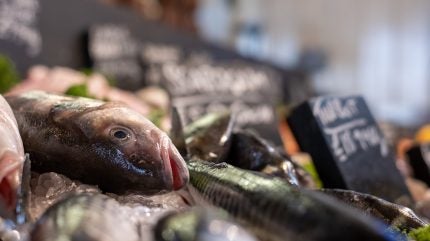
An Oceana report has revealed that half of the UK’s top ten commercial fish stocks, including North Sea cod and herring, are “critically low” or “overexploited”.
“The government’s failure to follow the science on catch limits and set a clear plan to end overfishing has pushed many of the UK’s most important fish populations towards collapse,” the NGO warned in a statement disclosing its findings.
It urged the UK government to “put in place a strategy to end overfishing, including a legally binding deadline and catch limits that will rebuild fish populations”.

Discover B2B Marketing That Performs
Combine business intelligence and editorial excellence to reach engaged professionals across 36 leading media platforms.
Only 41% of 105 assessed stocks were found to be “healthy”, with 27% “critically” depleted and 25% “overexploited”, Oceana suggested.
One in six stocks, including North Sea cod, suffer from both depletion and continued overfishing, putting them at risk of collapse, it added.
The International Council for the Exploration of the Sea (ICES) recently recommended a zero-catch limit for North Sea cod to avert further declines, according to the NGO’s report.
However, the report claimed UK ministers have continuously set catch quotas above “sustainable levels”, heightening the threat to fish populations and coastal livelihoods.

US Tariffs are shifting - will you react or anticipate?
Don’t let policy changes catch you off guard. Stay proactive with real-time data and expert analysis.
By GlobalDataFor three of the five most troubled stocks, quotas have exceeded recommended levels for five straight years, it said.
“Not once since the current total allowable catch system began have even half of UK catch limits been aligned with scientific advice,” the report noted, citing the UK government’s own fisheries advisers.
Hugo Tagholm, an executive director of Oceana UK, said: “Overfishing is not an unavoidable tragedy – it is a political choice. Ministers ignore the science time and time again and our seas are paying the price. Five years after becoming an independent coastal state, the UK seems to have accepted a state of relentless decline.”
He added: “We urgently need a plan to end overfishing, one that follows the science and puts our seas on a long-term path to recovery – ensuring a new generation of coastal prosperity.”
The Irish Sea and Celtic Sea are the hardest hit, while the West of Scotland fares better, the NGO said.
The Irish Sea saw overfished stocks increasing from 27% in 2020 to 41% today, while in the Celtic Sea, one-third of stocks are “critically” low.
In contrast, 62% of the assessed stocks were found to be healthy and just 12% overfished in the West of Scotland.
Oceana urged the UK government to work with devolved administrations to “urgently” develop a strategy to end overfishing by 2026 and establish a legally binding deadline to restore fish stocks with government accountability.
It also calls for aligning all catch limits with scientific advice by the end of 2025 and releasing an annual audit subject to parliamentary scrutiny.
Additionally, the organisation advocates a “fair deal” for fishmen transitioning to lower catch limits and sustainable practices.
In response, a Defra spokesperson told Just Food that the government is working with the fishing industry to “promote British seafood and manage stocks sustainably”.
The government body said a £360m ($482.9m) Fisheries and Coastal Growth Fund had been launched to “drive growth” in the industry.
“We are committed to restoring stocks to sustainable levels, with notable progress over the past five years, while supporting the long-term future of our fishing industry,” the spokesperson added.





